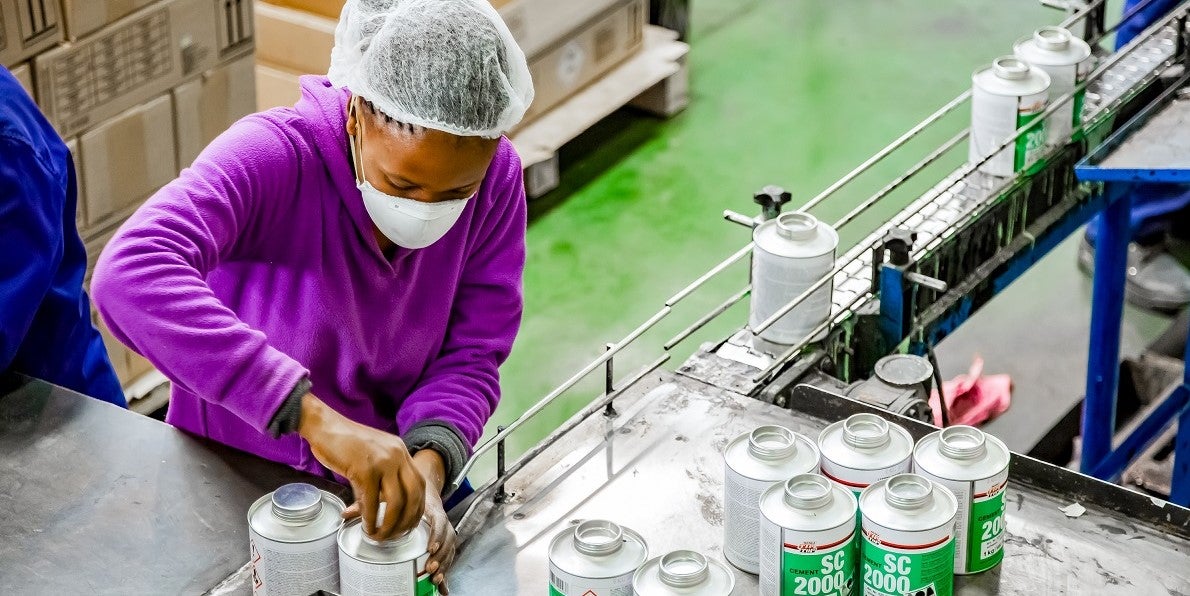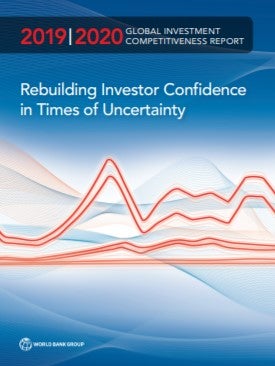 Una mujer trabaja en una cadena de producción de una fábrica de pegamento en Johannesburgo, Sudáfrica. Fotografía: © Sunshine Seeds/Shutterstock.
Una mujer trabaja en una cadena de producción de una fábrica de pegamento en Johannesburgo, Sudáfrica. Fotografía: © Sunshine Seeds/Shutterstock.
The damage has been done: COVID-19 has dealt the global economy its most severe blow since the Second World War, causing the broadest set of synchronized recessions the world has seen since 1870. Emerging-market and developing economies have suffered unprecedented capital outflows—just when, as a group, they face their first outright recession in 60 years.
Yet one key clear path to recovery is emerging amid the grim news: Developing economies must strive to restore and increase capital inflows, particularly in the form of foreign direct investment (FDI). FDI inflows have long been a key building block for developing countries, usually providing the largest source of external finance—more than official development assistance, or portfolio investment flows. They will be crucial for a COVID-19 recovery.
Developing economies must strive to restore and increase capital inflows, particularly in the form of foreign direct investment (FDI).
FDI flows were already slowing before the COVID-19 outbreak amid rising protectionism and other uncertainties that eroded investor confidence. The pandemic added a new—and unprecedented—risk to the mix, sending business confidence to historic lows, and resulting in an expected decline of 40 percent in global FDI flows.
But reviving confidence is not an impossible task. A new World Bank report sheds useful light on what it might take to increase FDI flows. It notes that 2,400 business executives polled in 10 major emerging-market countries reported that low taxes, low labor costs, and access to natural resources matter less to their investment decisions than political and economic stability and a predictable legal and regulatory environment. In short, the top three drivers of FDI decisions are entirely within the control of governments.
Policymakers in developing economies should seize the opportunity—as quickly as possible, as soon as the immediate health emergency is overcome. They have a chance to improve the long-term incentives for robust FDI flows to developing economies—which will emerge from the crisis heavily indebted and with limited fiscal space to pay for the reconstruction ahead. They have a chance to put in place complementary policies to ensure that FDI flows do not exacerbate inequality by benefiting mainly better-educated and higher-skilled workers.
Policymakers in developing economies should seize the opportunity—as quickly as possible, as soon as the immediate health emergency is overcome.
Reducing regulatory risk for investors has striking effects on FDI flows—even more than the effects of trade openness, our research shows. A one-percentage point reduction in regulatory risk tends to boost the likelihood of an investor entering or expanding in a host country by as much as 2 percentage points. By contrast, a one-point increase in the host country’s trade-to-GDP ratio boosts the likelihood by no more than 0.6 percentage point.
Given those effects, the World Bank has established a new global database for measuring regulatory risk. It includes about 14,000 parent companies investing in nearly28,000 new and expansion FDI projects across 168 host countries. Its analytical framework focuses on the three items that investors most closely associated with lower regulatory risk—transparency, legal protection for investors, and investor access to grievance-recourse mechanisms.
Improving transparency and reducing bureaucratic discretion is an important first step for governments in developing economies. This can make the business outlook more predictable and less risky for companies. Governments can strengthen transparency by consulting systematically with the private sector and other stakeholders. They can develop information portals to make laws and regulations publicly accessible. They should articulate clear and specific FDI-related legal provisions and administrative procedures.
Improving transparency and reducing bureaucratic discretion is an important first step for governments in developing economies.
Investment competitiveness and good governance were important markers of progress for developing countries long before the crisis began. COVID-19 has elevated their urgency. The magnitude and scale of the crisis require policy makers to employ their full arsenal of policy tools to rebuild investor confidence. They should rise to the occasion—by acting quickly, decisively, and collaboratively.



Join the Conversation